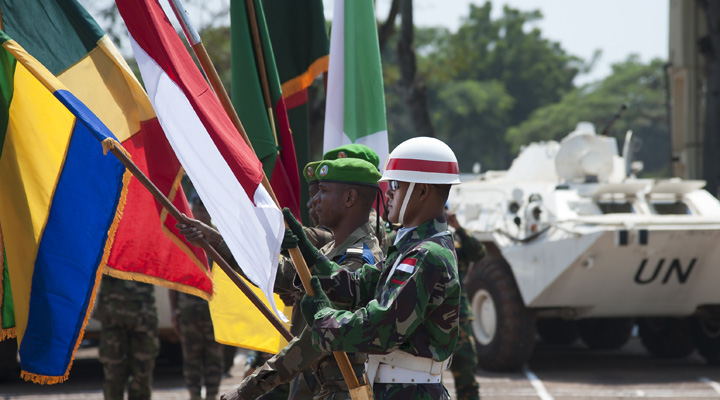The official hand-over ceremony in Bangui in 2014 when the UN"s MINUSCA took over peacekeeping responsibilities from the African-led MISCA. UN Photo/Catianne Tijerina.
The United Nations and African Union now deploy a record number of peacekeepers in Africa. In the past two years, the relationship between the two institutions has deepened, as new AU missions in Mali and the Central African Republic have transitioned into UN peacekeeping operations and ongoing missions in Somali and South Sudan have expanded considerably.
Yet the UN-AU relationship faces persistent challenges and dilemmas. As African-led peace operations include mandates for more offensive operations, how can the UN and AU ensure that their visions for peace operations are complementary and not contradictory? Given the lack of funding from AU member states, what kind of financial support should the UN provide to missions that it has authorized but does not lead?
This new IPI report offers an overview of the evolution of the UN-AU partnership on peace operations since 2005 and provides an analysis of UN-AU cooperation in recent African crises, including Mali, Somalia, the Central African Republic, the Democratic Republic of the Congo, and South Sudan. It examines the major outstanding challenges in the relationship between the UN and AU and suggests that the two institutions need to intensify efforts to streamline decision making and expand the nascent joint framework for enhanced partnership in peace and security.
The authors offer a number of specific recommendations for strengthening the partnership in peace operations, including the following:
- The UN Security Council and AU Peace and Security Council should establish a mechanism for financing UN-authorized AU peace support operations.
- The two councils should conduct coordinated threat assessments and periodic consultations to minimize policy divergence.
- The African Union should devote a portion of the regular AU budget to finance the union’s peace support operations.
- The AU should grant a special status to any member state elected to serve on the UN Security council that is not concurrently a member of the AU Peace and Security Council.








